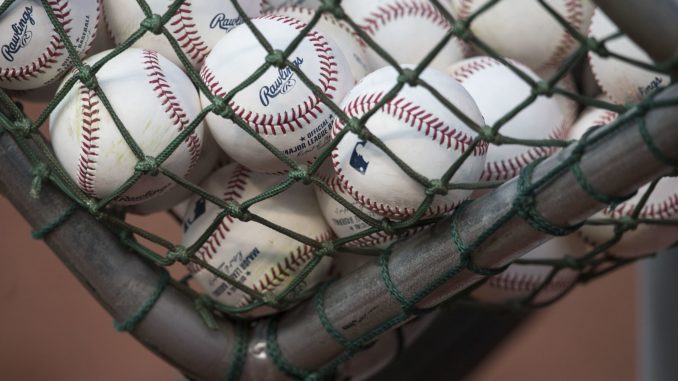
How do we fix baseball? It’s a conversation that seems to come up all the time in the baseball circles I travel in. It usually revolves around one or two specific issues like how to speed up the game or how to get more fans to attend games. All of these issues speak to an underlying anxiety that plagues the true baseball fan. As games like basketball and soccer continue to gain in popularity, it is unsettling to the baseball fan to see our game stagnant or even receding in popularity. It’s a complex problem that doesn’t lend itself to a singular solution. In order to grow the game into the next hundred years, numerous issues will need to be addressed and it will be impossible to please everyone.
Because I think it would be fun, I’m declaring myself King of Baseball for the purposes of this article. What follows are my decrees to move the game of baseball forward for the next hundred years.
Disclaimer: I realize that some or most of these things would result in additional cost and less revenue in the short term and thus are DOA in the real world. I’m addressing the question of what I would do to fix the game long-term if the good of the game and not the almighty dollar were the primary concern. Also, the opinions expressed here are my own and do not necessarily reflect the view of Prospects1500 and the other authors or editors of this site.
I hope you have fun imagining what the game could be through my eyes. Here we go…
Decree #1: Player Access
Abolish the Draft
There’s nothing as un-American in sports as denying workers the right to choose their employer as they enter the workforce. There is no other industry in America where the most talented college graduates are forced to spend the first years of their career laboring for the worst companies in the industry. The draft encourages clubs to put inferior teams on the field in the short term in order to gain cheap, talented labor for the coming years. In my version of MLB, I’m removing all incentives for teams to lose and giving freedom of choice to players from the first day they enter the league. Imagine if a player like Gerrit Cole, who has wanted to be a Yankee since he was a kid, had the right to pursue that dream without wasting some of his best years on a club that is go nowhere and having to go to another club to prove himself. Imagine if he had been able to just sign with the Yankees because that’s the company he wanted to work for.
Youth Development
One of the biggest issues facing MLB over the long term is growing interest in playing the game at the little league level and the inherent advantage that affluent families have in access to talent development resources. If MLB is the steward of the game, they should steward the game at all levels. MLB will partner with Little League Baseball to make playing the game in an organized league available to all children under the age of 15 for FREE with the understanding that growing the game will pay back in the long run. MLB will build and maintain the fields, screen and appoint the coaches and provide all other structures necessary to make Little League the best youth sports program in the country. The number one focus of the program will be to provide all the player development resources in one location so that a parent’s ability to pay for extra instruction will be of little to no advantage in their kid’s development. When all kids from all racial, social and economic backgrounds have equal access to these resources and equal chance to play the game and be discovered, the game is infinitely stronger.
Each MLB club will operate a player development academy. Players are eligible to join an academy at the age of 15. Academies will work in coordination with local schools to provide advanced baseball instruction and development while supporting the player’s primary education. Players attend academy on a yearly scholarship based on both baseball performance and educational requirements. Because the program is free, access to the best player development resources is not limited to affluent families. The most talented and driven players will have free access to the best resources regardless of race or economic background. Players that are registered with an MLB club’s academy on their 18th birthday are automatically awarded a basic professional contract that extends through the end of the MLB season that ends after their 25th birthday. This is the reward that the MLB club receives for investing in the player’s development, but it still allows the player to hit the free agent market before their prime playing years. In theory, at this point the player has grown up in the club and will be likely to resign with the club, but it’s still their choice. This also eliminates the incentive for clubs to hold talented players down in the minors since these players will hit free agency at 25-years-old either way.
Abolish International Bonus Recruiting
All international players will be given the same access to player development academies as domestic players. There will be no more big bonuses being skimmed by shady agents and player representatives. If the player is worth signing, they are worth the investment of bringing them to your stateside academy or providing that same experience in their home country.
High School and College Players
It will not be possible for all players with the talent to make it to MLB to be identified and invited to MLB academies. Players will still emerge from high school and college teams. These players will be free to sign with any MLB club on their 18th birthday. It will be up to each club to make their program and compensation attractive to incoming players. Money is not the only means to get good players to sign. Having the best development staff, facilities and access to future MLB playing time will all be factors in bringing talent to the MLB club.
Decree #2: Fan Access
Remove Blackout Restrictions from MLB Streaming Services
Obviously, local TV deals are a prime source of revenue for MLB clubs and there’s no reason that teams can’t continue to sign these deals. However, blackouts hurt the growth of the game, especially in large areas of “no man’s land” where a single household can be blacked out of as many as 4 teams with no access to any of these teams on their local TV carriers. Teams will make less on these TV deals without the blackout clause. To make up for that revenue loss, MLB will structure their streaming service in such a way that teams will receive portions of the revenue from the streaming service based on which team the user clicks to watch a game. If you are a Cubs fan and want to watch the Cubs game you will click on the Cubs logo and the Cubs will receive a “watch credit” for you watching the game. Giving fans full access to all games on the streaming service will allow teams to grow their fanbase organically. Teams that develop great talent and win games will grow their fanbases. Losing teams will not be adding fans and thereby losing revenue.
Get the Stars on National TV
When I was growing up, the Chicago Bulls game was on national TV just about every week. I could follow the Bulls well from South Florida with an old box TV and a “bunny ears” antenna. Ronald Acuna, Juan Soto, Aaron Judge and Mike Trout should be on national TV every week regardless of what team they play on. If you develop the best and most exciting players, you get the airtime on national TV. MLB should be showcasing their most talented players and hyping them relentlessly. This is how you get people who don’t follow baseball engaged.
Decree #3: League Structure
More Emphasis on Balance, Regular Season and Consistent Winning
This one may seem counterintuitive, but hear me out. Expand to 32 teams and get rid of divisions. The 16 teams in each league play a balanced schedule with each team playing every other team in their league 10 times for a total of 150 games. The other 12 games will be interleague games which will take place during the week before and week after the All-Star Game. The top two teams in the league standings at the end of the season will play in the NLCS and ALCS. By eliminating the wild card and divisional rounds of the playoffs, regular season games now hold more importance and more intensity. Because of the balanced schedule, there is no need for additional playoff rounds to determine the best representative for the World Series. The playoffs now take place over the entire month of September as the top teams scratch and claw for every game in a desperate run for a spot in the LCS. The most important thing is that this guarantees that the two best teams play for the league championship every year and a hot team can no longer steal a ring. You have to be good all season consistently to win it all. This is the way baseball was for the majority of its history. I think we’ve talked ourselves into believing that the current way is better when it’s really worse.
Revamp the Minor Leagues
Each MLB team will now have three affiliated teams in a new minor league structure. The Development Level will be for young players graduating from the team academies as well as new high school and college signings. The Prospect Level will be for top prospects that are on the cusp of major league promotion. And finally, the Reserve Level will be for players with some major league experience that are serving as depth for the big league team, need to rehab an injury or have struggled and need more seasoning.
Because of the limited number of spots in the three tiers of affiliates, all players playing in a club’s affiliated system will be paid a full player salary equal to one fourth of the MLB minimum. This incentivizes teams to invest in the players that they believe in and not let any of their players get lost in the system. All other professional teams will operate independently of MLB and can offer players whatever salary opportunity they can afford. They can then transfer players that do well to an MLB club for a fee to increase revenue. This will allow more players to have a real opportunity to make it to the big league level. Players that might otherwise get lost in an MLB system will be getting development attention from the independent club for the purposes of selling their contract for a profit.
Bottom Line
Baseball is the greatest game ever devised by man. There isn’t a way to make the game itself appealing to people who either don’t like it or don’t have the attention span for it, at least not without ruining the game in the process. Instead of trying to shave a few minutes off of the length of a game with gimmicks, baseball needs to focus on cleaning up the structural and systemic inefficiencies that keep people from playing the game and thriving all the way through the climb to the majors. The popularity of the game is dependent on the talent and appeal of the players and the excitement that they generate for a paying audience. Making the player’s baseball journey better and making the game more accessible to young players and fans is the key to the future of this great game.
I hope you’ve enjoyed this article. I love to debate these things, so please let me know what you think in the comments. You can also follow me on Twitter @ChappyisClutch.





You should be running MLB ! Unfortunately the owners are the most greedy and dishonest of all leagues worldwide. Having a baseball classic instead of participation in the BB World cup or Olympic games proves this.